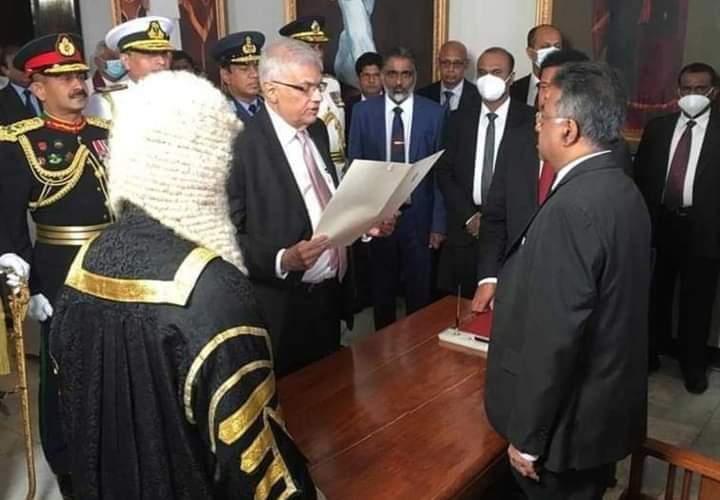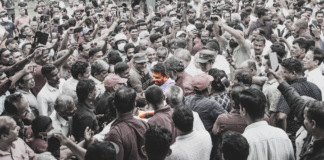July 21, 2022 18:06 JST BANGKOK —
When Ranil Wickremesinghe was sworn in as Sri Lanka’s eighth executive president on Thursday morning, it capped a remarkable comeback for a six-time prime minister who lost his seat in the last polls and was only in parliament thanks to a quirk of the system.
On Sri Lanka’s boisterous social media, Wickremesinghe has been described as a “man with no mandate,” among other barbs. Such doubts will be hovering over the 73-year-old as he attempts the daunting tasks of restoring political calm and lifting the debt-ridden South Asian economy out of bankruptcy.
Wickremesinghe’s rise was but the latest twist in Sri Lanka’s relentless political and economic upheaval. Since April, the country has seen severe shortages of fuel and power, massive anti-government demonstrations in the commercial capital of Colombo, and its first-ever default on foreign debt. Last week brought the stunning resignation and exile of hawkish President Gotabaya Rajapaksa, who was essentially driven out of the country by enraged protesters who stormed his residence.
The new president finally managed to occupy the land’s most powerful office — one he unsuccessfully ran for twice — thanks to an apparent alliance of convenience with the Rajapaksas, the nation’s most influential political clan and long a thorn in his side.
Despite their differences, Wickremesinghe has been followed by perceptions that he protected the Rajapaksas over the years, amid swirling but unproven allegations of corruption against them. In mid-May, the embattled then President Rajapaksa did little to dispel such notions when he appointed Wickremesinghe prime minister.
That job was only vacant because Gotabaya’s brother, Mahinda Rajapaksa, had quit following clashes between peaceful protesters and pro-government goons. Now, the Rajapaksas seem to be staking hopes of salvaging their dynasty on Wickremesinghe turning around the country they left in tatters.
That became evident this week when Sri Lanka Podujana Peramuna (SLPP), the ruling party that serves the interests of the Rajapaksas, made Wickremesinghe its candidate for the unprecedented presidential vote in parliament — and then ensured that he triumphed on Wednesday with 134 votes. The runner-up, journalist-turned-politician and dissident SLPP member Dullas Alahapperuma, received only 82 votes.
Afterward, Wickremesinghe insisted to reporters that he was “not a friend of the Rajapaksas” but rather a “friend of the people.”
Wickremesinghe would appear to have little to offer as a proxy. The party he leads, the right-of-center United National Party (UNP), suffered its worst electoral defeat in the 2020 parliamentary polls, while the SLPP grabbed 145 seats in the 255-seat legislature.
The UNP received only 249,435 votes, barely over 2% of the total, and won only a single seat through the proportional representation system. That place went to Wickremesinghe, who lost his own seat in Colombo, long a stronghold for a party that had previously 105 seats in total. Many observers blamed Wickremesinghe for the UNP’s humiliating fall from grace.
Nevertheless, fortune has often smiled on Wickremesinghe since 1977, when he was first elected to parliament in a UNP landslide. The party was led by his uncle, the formidable Junius Richard Jayewardene, soon to become the first executive president. Freshman lawmaker Wickremesinghe was named minister of youth affairs and employment in Jayawardene’s first government, becoming, at age 28, the country’s youngest cabinet member.
This nod from uncle to nephew laid the groundwork for Wickremesinghe to carry the political mantle of his clan, which belonged to the affluent, Westernized, English-speaking elite minority that had shaped the country since independence from the British in 1948.
The Rajapaksas, by contrast, hail from a rural landowning clan, steeped in the Sinhala-Buddhist ethos, and have struggled to become members of Colombo’s upper class.
Besides his political heritage, Wickremesinghe was able to take advantage of media connections. His grandfather was the country’s dominant press baron, whose newspapers continue to wield influence over the political narrative.
His next break came in 1993, when he was picked as prime minister by then President Dingiri Banda Wijetunga, who had stepped into the role after the incumbent, Ranasinghe Premadasa, was assassinated by the separatist Tamil Tigers. By then, more formidable ministers from the UNP government had split from the party to form a new faction or had been killed during the bloody conflict gripping the country.
Wickremesinghe used his first term as premier to set the tone of his future administrations. He sought to portray himself as being business-friendly and open to economic reform. He also proved willing to take political risks: In his second stint as prime minister from 2001 to 2004, he reached out to the Norwegians to help broker a peace deal with the Tamil Tigers, a move that turned the majority Sinhala-Buddhist population against him.
Wickremesinghe’s allies play up his other qualities, saying he is respected internationally and pointing to healthy ties with India, Japan and the U.S. While his government will have to dish out some bitter economic pills to qualify for a bailout from the International Monetary Fund, supporters insist that he is the best man for the job, despite the risk of further public backlash.
“If not Ranil, who?” asked one confidant who is a member of Wickremesinghe’s inner circle.
Having taken the oath on Thursday, Wickremesinghe is now due to finish the remaining two and a half years of Gotabaya’s presidential term. He has, for the moment, ended a power vacuum, potentially paving the way for negotiations with the IMF to move forward.
Yet, Wickremesinghe’s own history offers a cautionary tale for those banking on him to complete his full term as the new president. After all, he was never able to complete any of his six stints as prime minister.
NIKKEI Asia





